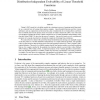Free Online Productivity Tools
i2Speak
i2Symbol
i2OCR
iTex2Img
iWeb2Print
iWeb2Shot
i2Type
iPdf2Split
iPdf2Merge
i2Bopomofo
i2Arabic
i2Style
i2Image
i2PDF
iLatex2Rtf
Sci2ools
115
click to vote
CORR
2011
Springer
2011
Springer
Distribution-Independent Evolvability of Linear Threshold Functions
Valiant’s (2007) model of evolvability models the evolutionary process of acquiring useful functionality as a restricted form of learning from random examples. Linear threshold functions and their various subclasses, such as conjunctions and decision lists, play a fundamental role in learning theory and hence their evolvability has been the primary focus of research on Valiant’s framework (2007). One of the main open problems regarding the model is whether conjunctions are evolvable distribution-independently (Feldman and Valiant, 2008). We show that the answer is negative. Our proof is based on a new combinatorial parameter of a concept class that lower-bounds the complexity of learning from correlations. We contrast the lower bound with a proof that linear threshold functions having a non-negligible margin on the data points are evolvable distribution-independently via a simple mutation algorithm. Our algorithm relies on a non-linear loss function being used to select the hypoth...
CORR 2011 | Education | Evolvability | Quadratic Loss | Valiant |
| Added | 13 May 2011 |
| Updated | 13 May 2011 |
| Type | Journal |
| Year | 2011 |
| Where | CORR |
| Authors | Vitaly Feldman |
Comments (0)

